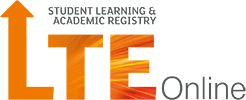Prioritising flexible assessment arrangements in a hybrid model means shifting on to more sustainable approaches designs that are sensitive to the needs and circumstances of students, giving them more control and ownership over assessment processes. ‘Flexibility’ in assessment is about responding to students’ individual learning needs as well as needs of the curriculum. The key is making assessment relevant to the learner.
Flexible Assessment for a Hybrid Model
Why Flexible Assessment? Assessment has a major impact on students and their learning whatever the delivery model (face-to-face, online, blended). Developing and deploying flexible and innovative assessment supports the need to be responsive to the requirements of a hybrid model
LTE Bites 06 – Strategies for Embedding Flexible Assessment
Click here to download this document: LTE Bites 06 – Strategies for Embedding Flexible Assessment
Flexible Assessment in a Hybrid Delivery Model
When we refer to flexibility in learning, we usually focus on flexible instruction: we strive to implement instruction that supports more flexibility in time, space, pedagogy, and technology (Jones-Devitt, 2020). However, being flexible allows us to change more than our instruction…
Flexible Assessment Designs for Future Facing Learning
Assessment designs that consider future professional landscapes for HE graduates, need to recognise that as our world changes, so too our learning, teaching and assessment practices must find new forms to help support learners not just react to current trends or to repeat dominant patterns of thinking, but be capable of constructively reappraising their approaches…
Upcoming Workshop 16th November – Getting the Most out of Assessment and Feedback
Getting the Most out of Assessment and Feedback – Monday 16th November 2020 @ 14:00hrs.
Academic colleagues will be supported to reflect on and craft a principled, evidence-informed approach to devising flexible assessment and feedback strategies, gaining valuable insights and practical guidance into ways they might optimise their own assessment practices for themselves and their students…
Formative Assessment for Hybrid Learning
With the shift to hybrid learning, students are having to become increasingly more proactive. Students now need to think much more carefully about where they are now, where they are going and how to get there. However, this contrasts with
Principles of Course Design for Hybrid Learning Toolkit – Part 6: Designing your summative assessment
Part six of the toolkit covers designing summative assessment. During this time, staff and students are having to adapt and become flexible in order to cope with the unprecedented levels of change and uncertainty. This is not only within their academic work, but also with their personal lives beyond university…
Considerations and Resources for Supporting Alternative Assessment Methods in a Hybrid Delivery Model
Recent published guidance around the need to develop Flexible Assessment for a Hybrid Model outlines the importance for assessment arrangements to be responsive to the requirements of a hybrid model of learning and teaching and the possibility of a combination of on-campus and online delivery from September 2020…
Formative Assessment for online learning – Did you know?
With the sudden shift to online learning during the Covid-19 crisis, students are having to become increasingly more active in their learning. Students now need to think much more carefully about where they are now, where they are going and how to get there. However, this contrasts with students being predominantly consumers of knowledge in a campus-based setting…
